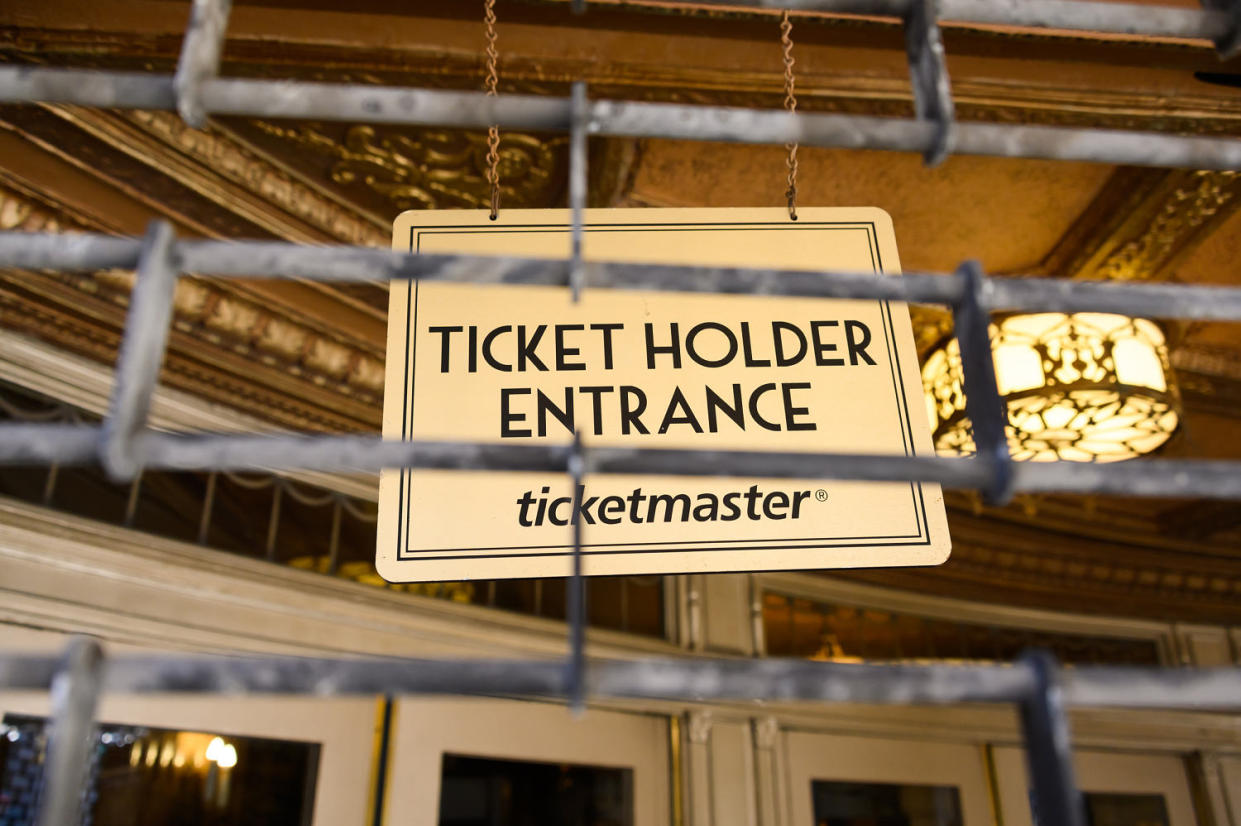Opinion | How Live Nation-Ticketmaster became the villain of our time

- Oops!Something went wrong.Please try again later.
The Biden administration, along with a bipartisan group of 30 state attorneys general, filed suit Thursday against Live Nation, the parent company of Ticketmaster. The lawsuit seeks to break up what the government claims is an illegal monopoly. The main reaction from everyone — well, almost everyone — has been: It’s about time.
The entertainment colossus, the result of a vertical merger between promoter Live Nation and ticket seller Ticketmaster, is widely loathed by music and sports fans alike. The combined company controls a large majority of the most lucrative music amphitheaters in the United States, and accounts for about 70% of all ticket sales at large venues. They also promote shows and manage artists. Customer ire at the company has steadily risen over the years, and reached new heights when its control of ticket sales for Taylor Swift’s Eras tour resulted in both an epic system meltdown and surging prices. Since then, the word “Ticketmaster” has become shorthand for how companies with monopolistic control over a market segment degrade American life.
When the Obama administration approved the merger of Live Nation and Ticketmaster in 2010, they did it with the proviso that the company could not use its size to push competitors around by methods such as not booking artists it managed in venues using rival ticket sellers. Regulators were so gung-ho on this deal, they predicted both ticket prices and service fees would fall.
This proved to be woefully naïve.
As anyone who has attended a concert or sporting event in the past decade can attest, junk fees skyrocketed. The American Economic Liberties Project (disclosure: where I am a managing editor) determined that the combination of convenience fees, processing fees, facility fees and the like could make up as much as 78% of a ticket’s cost. In other countries where venues can use multiple ticket sellers, competitive pressures result in significantly lower fees.
As for its behavior toward its competitors, the company acted so badly that the Trump administration — not known for regulating businesses — stepped in in 2019 to extend the consent agreement that banned the company from anti-competitive practices like withholding talent from concert venues with other ticket services.
Workaday artists have complained as well, saying the company used its size and dominance to eat into the money they earned touring. Such complaints go back decades, predating even the merger. In 1994, Pearl Jam accused Ticketmaster of pressuring promoters against booking the band after it complained about the company’s pricing.
As Jonathan Kanter, the head of the Justice Department’s anti-trust division, put it in a news release announcing the case, “The live music industry in America is broken because Live Nation-Ticketmaster has an illegal monopoly.” It’s not possible to say no to Ticketmaster, not if you want to see a live show. They’ve stuck their greedy snout in so many parts of the process, they are all but impossible to avoid. Little wonder CNBC’s Jim Cramer, hardly an avid trustbuster, said Thursday that he has long recommended the company’s stock because “it’s the best gouger in the world.” (“Alleged gouger,” he quickly added.)
Live Nation-Ticketmaster, naturally, denies all and says they will fight the Biden administration in court. The company says artist greed is partially responsible for the fees and ticket prices and, if scalping is so prevalent, it’s only because the public demands it. While there is some truth to the notion that the most popular entertainers are likely using Ticketmaster as a convenient excuse to charge higher prices, that’s not a defense against the broader issue: whether the company is using its power to block rivals and take advantage of the public.
The few defending the company seem half-hearted at best. Their complaint, on both the left and the right, seems to amount to “doesn’t the Biden administration have anything more serious to do with their time?” That reaction misunderstands the situation. First, the rule of law matters, even when we’re discussing something as frivolous and discretionary as concert tickets. Second, many Americans quite reasonably think no one in government listens to — never mind addresses — their political and economic concerns. That’s the sentiment that got Donald Trump elected to the White House in 2016 and could do so again this year.
Ever-growing monopolies are a major part of this problem. The Biden administration, to its credit and to the fury of both Wall Street and Silicon Valley, is pursuing anti-trust violations with a vigor not seen in decades. The Federal Trade Commission recently filed suit against the proposed merger of grocery store giants Kroger and Albertsons, arguing that it will raise grocery prices and harm workers. The DOJ has filed anti-trust suits against Google and Apple and already stopped a proposed JetBlue-Spirit merger in court.
As companies become dominant in a market, costs surge even as the quality of the service on offer declines. Even for people who don’t live and breathe politics, Live Nation-Ticketmaster has come to symbolize how large and increasingly unaccountable corporations diminish our lives even as they gouge us financially. Combined with our post-Covid party-hardy ways, the issue has turned into political dynamite. Live Nation-Ticketmaster’s executives should have recalled a basic business adage: Pigs get fed while hogs get slaughtered.
This article was originally published on MSNBC.com

